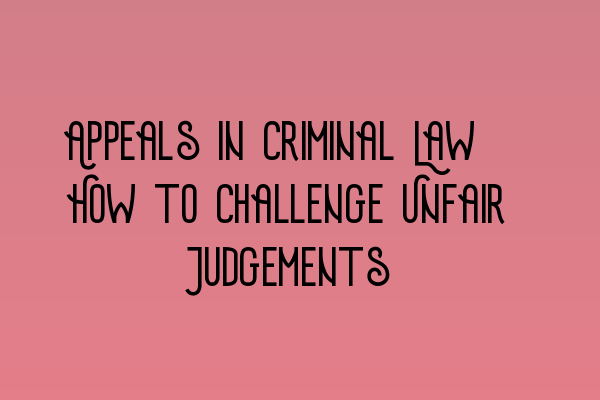Appeals in Criminal Law: How to Challenge Unfair Judgements
Are you unhappy with a criminal judgement that you believe is unfair? As an individual who believes in justice, you have the right to challenge a decision made by the court. In the criminal justice system, appeals serve as an essential mechanism for correcting errors or injustice that may have occurred during trial. In this blog post, we will explore the process of appealing a criminal judgement and provide guidance on how to navigate through the complex appellate system.
Understanding the Grounds for Appeal
Before initiating the appeals process, it’s crucial to understand the grounds on which you can challenge a judgement. Common grounds for appeal in criminal cases often include:
- Legal Errors: If there were errors in the application or interpretation of the law during the trial, it may be possible to appeal on the basis of legal errors.
- Procedural Errors: Procedural errors, such as mishandling of evidence or failure to follow proper legal procedures, can also be valid grounds for appeal.
- New Evidence: If new evidence comes to light that could potentially impact the outcome of the case, appealing on the basis of new evidence may be an option.
- Improper Conduct: If it can be proven that there was improper conduct by the prosecution or the judge during the trial, it may be possible to appeal on the grounds of improper conduct.
Understanding the specific grounds for your appeal is crucial, as it will help determine the legal arguments and strategies to be employed in challenging the judgement.
The Appeals Process
Once you have identified the grounds for your appeal, it’s time to navigate through the appeals process. The process typically involves the following steps:
- Filing a Notice of Appeal: The first step is to file a formal “Notice of Appeal” with the relevant appellate court. This document outlines your intention to challenge the judgement and provides a brief overview of the grounds for appeal.
- Preparing the Appellate Brief: The next step involves preparing a comprehensive appellate brief that presents the legal arguments supporting your appeal. This document should be well-researched, persuasive, and address all relevant legal issues.
- Presenting Oral Argument: In some cases, the appellate court may grant the opportunity to present oral argument. This allows you to present your case verbally before a panel of judges, highlighting key legal points and addressing any concerns raised by the court.
- Receiving the Appellate Decision: After the appellate court has reviewed your appeal, a decision will be rendered. This decision may uphold the original judgement, modify it, or, in some cases, order a new trial.
It’s important to note that the appeals process can be lengthy and complex. It requires a thorough understanding of the law, persuasive legal arguments, and proper presentation of evidence. Consulting with an experienced criminal law solicitor is highly recommended to navigate through this intricate process.
Consulting with a Criminal Law Solicitor
Enlisting the support of a knowledgeable criminal law solicitor is invaluable when challenging an unfair judgement through the appeals process. A solicitor specializing in criminal law will provide expert guidance and representation throughout the entire process, ensuring that your rights are protected and the best possible legal strategies are employed.
At SQE Criminal Law & Practice Law UK, our team of experienced solicitors have a deep understanding of the appeals process in criminal law. We have successfully handled numerous appeals, helping clients challenge unfair judgements and seek justice. With our expertise and dedication, we will work tirelessly to build a strong case and present persuasive legal arguments on your behalf.
When it comes to appeals in criminal law, it’s essential to have a skilled and knowledgeable advocate by your side. Contact SQE Criminal Law & Practice Law UK today to schedule a consultation and take the first step towards challenging an unfair judgement.
Conclusion
The appellate process provides individuals with an opportunity to challenge unfair judgements and seek justice in the criminal justice system. By understanding the grounds for appeal and navigating through the appeals process with the right legal representation, you can increase your chances of overturning an unjust decision.
If you are considering appealing a criminal judgement, it is crucial to consult with a reputable criminal law solicitor who specializes in appeals. At SQE Criminal Law & Practice Law UK, we are dedicated to helping clients navigate through the complex appellate system and advocating for their rights. Contact us today for expert legal advice and representation in your appeals case.
